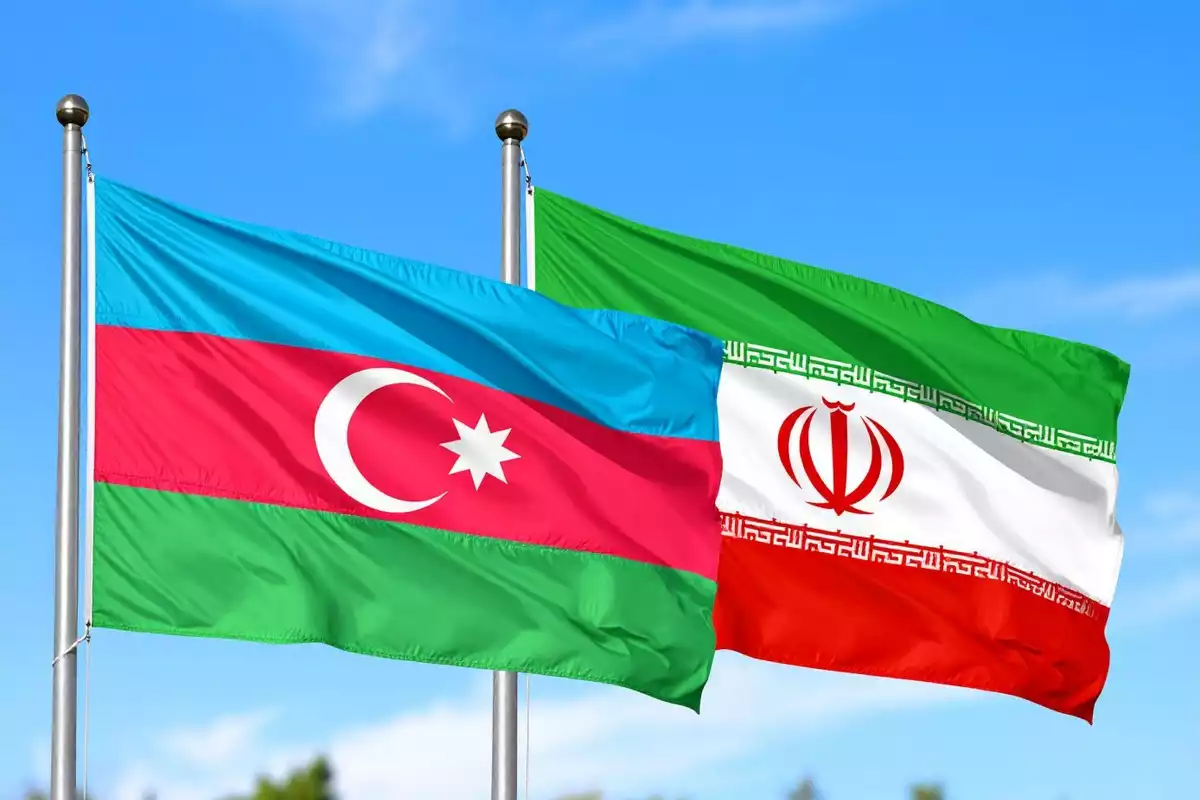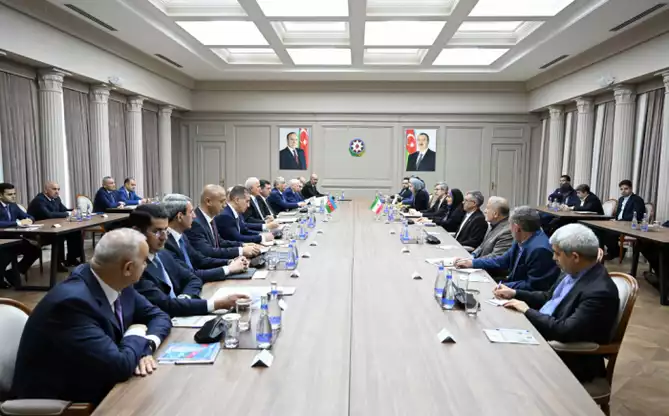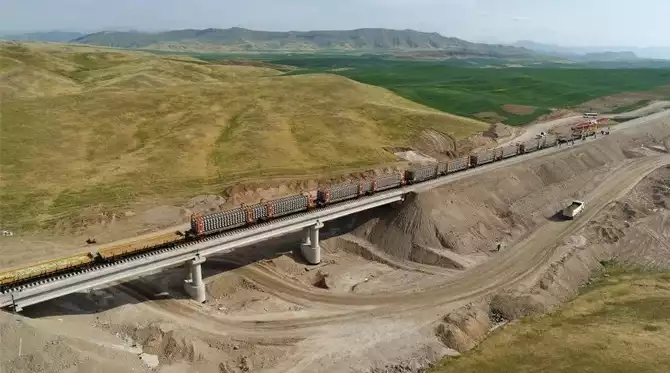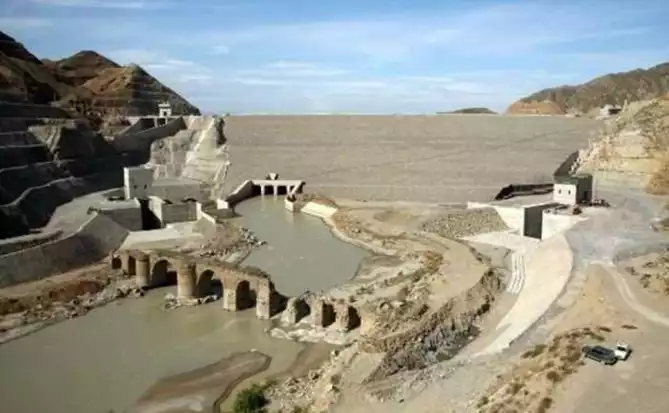
On Monday, April 28, Iranian President Masoud Pezeshkian will visit Azerbaijan at the invitation of President Ilham Aliyev.
Hossein Pirmoazzen, Deputy Chairman of the Iranian Chamber of Commerce, Industries, Mines, and Agriculture, announced at a recent meeting of the Government-Private Sector Dialogue Council that the President will be accompanied by a delegation of 120 people, including representatives of the private sector, members of the Iran-Azerbaijan Parliamentary Friendship Group, and governors of four northwestern provinces of the Islamic Republic of Iran. Special attention during the visit will be devoted to relations between the private sectors of the two countries and the development of economic ties in the context of broader cooperation initiatives.
On April 8, President Ilham Aliyev received Iran’s Minister of Roads and Urban Development and Co-Chairman of the Azerbaijan-Iran Joint Intergovernmental Commission on Economic Cooperation, Farzaneh Sadegh. During the meeting, the two sides exchanged views on the development of the North-South International Transport Corridor, the project to construct a road bridge over the Araz River linking Agbend and Kelaleh, as well as on cooperation in other areas of mutual interest.

Photo credit: X
On the same day, Ms. Sadegh also met with Deputy Prime Minister Shahin Mustafayev, who co-chairs the State Commission on Economic, Trade, and Humanitarian Cooperation between Azerbaijan and Iran. Both sides confirmed that high-level contacts are crucial for defining the current agenda and strengthening a constructive dialogue.
According to expert assessments, Azerbaijan-Iran relations are currently demonstrating positive momentum across various sectors. There is significant potential for collaboration in trade, investment, transport, the oil and gas sector, energy, agriculture, and other fields.
Typically, the level of bilateral relations is reflected in trade turnover. In 2024, bilateral trade grew by 32 percent. This year, the volume of bilateral cargo transportation between Azerbaijan and Iran is projected to increase by 20 percent, while transit shipments are expected to grow by over 23 percent. Azerbaijan and Iran have set an ambitious goal: to raise their annual trade turnover to $10 billion within the next five years - a target they are well-positioned to achieve.
Transport and logistics projects play a special role in Azerbaijani-Iranian cooperation.

Photo credit: IRNA
“Infrastructure initiatives such as the North-South Transport Corridor, the Araz Corridor, the new border crossing and terminal at Astara, and the construction of the Agbend-Kelaleh bridge testify to the vast potential for economic cooperation between Azerbaijan and Iran,” Azerbaijani media quoted Seyyed Jafar Aghaei Marian, Chargé d’Affaires of the Iranian Embassy in Baku, as saying.
The agreements already reached regarding the development of international transport corridors are of fundamental importance. These projects not only connect regions of the world but, above all, link our two nations.
Work is underway to expand the North-South International Transport Corridor, including the construction of the Astara cargo terminal and a new road and pedestrian bridge across the Astarachay River. Iran has also expressed strong interest in the development of the East-West transport and logistics corridor passing through Azerbaijan.

Photo credit: TASS
Particular emphasis is being placed on the Agbend-Kelaleh railway and highway, which will form part of a vital communication line connecting Azerbaijan’s western regions with the Nakhchivan Autonomous Republic. As part of this broader project, new road bridges at Siyahroud-Ordubad are under construction, along with the necessary border and customs infrastructure.
Iran anticipates that the completion of these border communications and infrastructure will open up vast new opportunities, particularly once the Agbend-Jabrayil-Aghdam-Yevlakh-Georgia and Agbend-Lachin-Kalbajar-Ganja-Georgia highways become operational. These routes will provide Iran with the most convenient and cost-effective access to the Black Sea.
Cooperation in the energy sector is also progressing successfully.

Photo credit: Trend
Noteworthy projects include the Khudafarin and Giz Galasi hydroelectric complexes, as well as the Araz, Ordubad, and Marazad hydroelectric power plants.
It is important to highlight that agreements on the Araz
River hydro projects were reached during the Armenian occupation of Azerbaijan’s border territories with Iran. Despite the difficult circumstances, the Iranian side remained committed to honoring these agreements.
Energy cooperation also extends to electricity exchanges.
The power grids of Azerbaijan and Iran are interconnected at five points, with a total capacity of 860 MW, playing a crucial role in ensuring energy security and supporting sustainable collaboration.
Moreover, an additional power transmission line is planned along the Araz Corridor, which will further bolster regional energy security. Prospects for partnership in the oil and gas sector are also being actively explored.
In short, the Presidents of Azerbaijan and Iran will have much to discuss during their meeting in Baku. The initiatives already underway - and those envisioned - serve the interests of both countries and their peoples, contributing to broader regional stability and prosperity.
The upcoming visit of President Masoud Pezeshkian to Azerbaijan marks not just another diplomatic event, but a powerful signal of the deepening ties between Baku and Tehran. As both nations invest in ambitious transport, energy, and trade projects, they are laying the groundwork for a partnership that transcends traditional boundaries, strengthening regional connectivity and stability. With vision and determination, Azerbaijan and Iran are turning shared opportunities into lasting achievements - and their journey is only just beginning.
Share on social media